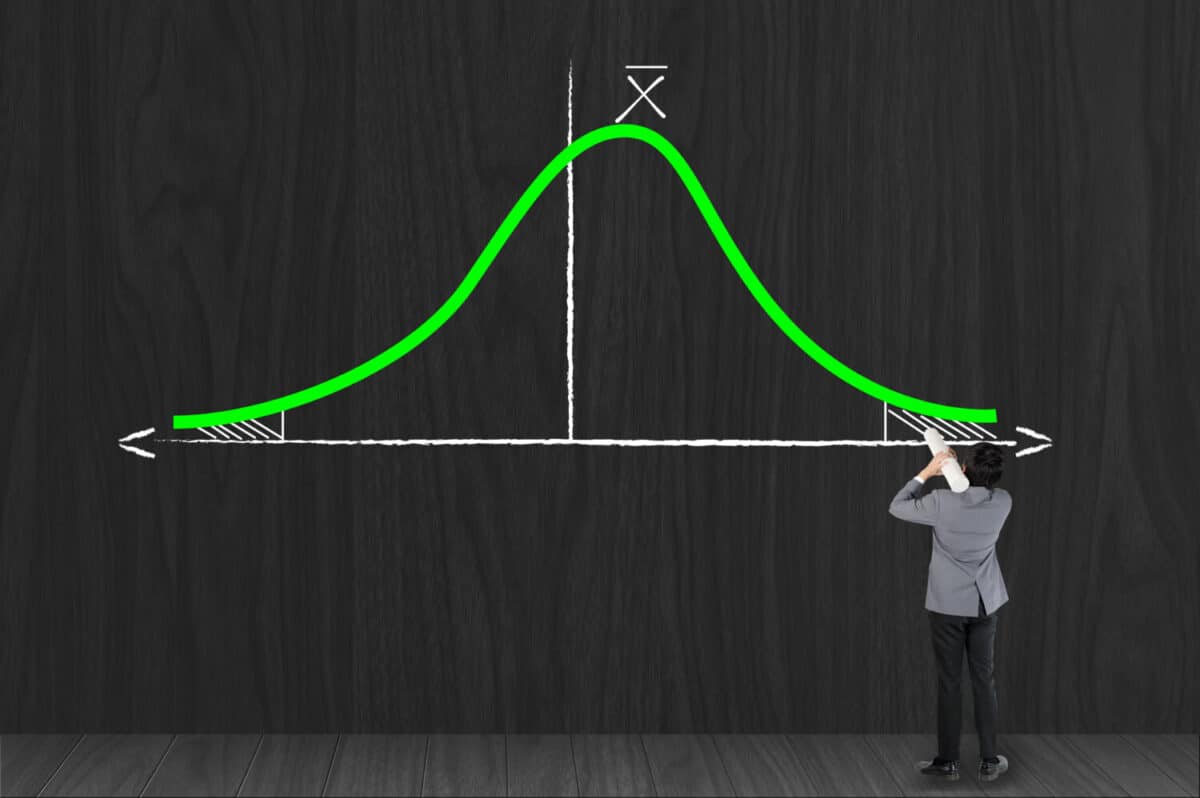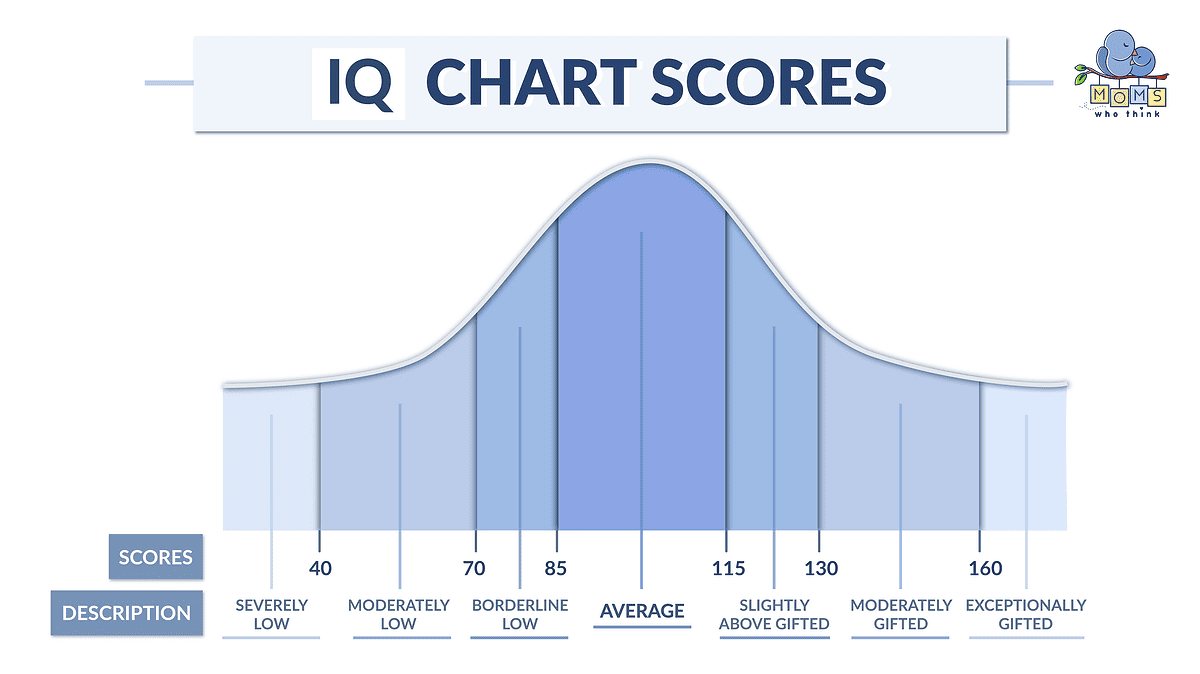People have long considered IQ rates as the determining factor for intelligence. However, with all of the online quizzes and forums these days, it can be difficult to get an accurate representation. What does IQ stand for? What does your score mean about you and your intelligence? We will discuss all of that and more in this article, as well as provide you with a free IQ chart to help you see where your number falls on the average scale.
What Is IQ?

The letters IQ stand for intelligence quotient.
©MillaF/Shutterstock.com
We hear these two letters thrown around all the time but what do they mean? Many people have an understanding that having a high IQ is a good thing and that it supposedly means that you are smart, but what does it mean? Let's start with the basics, what does IQ stand for? IQ stands for intelligence quotient. More simply put, it is a measure of someone's reasoning ability. Experts believe that a person's IQ accurately showcases how an individual would use information and logic to solve problems, answer questions, or make predictions in given situations. Furthermore, your IQ score indicates where you fall in terms of mental ability amongst other people.
How Is IQ Measured?
A person's IQ is measured by taking an IQ test. These tests are usually taken when parents want to discover their children's IQ regarding school performance. Additionally, adults may take an IQ test to help them determine job suitability or to gain assistance with career guidance. These tests measure how well an individual can solve problems, and recall information, as well as their short and long-term memory. Additionally, here are some other things that an IQ test will measure:
- Logic
- Spatial Awareness
- Verbal Reasoning
- Visual Abilities
- Recognize Patterns
- Make Connections
How Do I Read an IQ Chart or Results?

An IQ chart is usually in the shape of a Bell Curve, with the peak of the curve being the average result.
©Singkham/Shutterstock.com
While there may be some differences based on the place of administration, there are a few terms that should remain constant regardless of where you get your test done. The first term is the Bell Curve. The Bell Curve is how IQ scores are measured. This curve shows the normal distribution of whatever is being measured, as well as the outliers on either side. In regards to IQ, the peak of the curve is typically where the majority of people will land. One side of the slow represents those who fall in the below-average section, while the other side of the slope showcases those who score in the above-average range.
Mean refers to the average score, which is calculated by adding all the scores together and dividing by the total number of scores. Finally, there is the standard deviation. This is a measure of variability in the population. For example, if you have a low standard deviation, that means most of the data is close to the same value.
IQ Chart Rankings
The average score on an IQ is 100, with the majority of people falling between 85 and 115. Below is the ranking of an IQ test and their associated meanings.
- 1 to 24: Profound mental disability
- 25 to 39: Severe mental disability
- 40 to 54: Moderate mental disability
- 55 to 69: Mild mental disability
- 70 to 84: Borderline mental disability
- 85 to 114: Average intelligence
- 115 to 129: Above average or bright
- 130 to 144: Moderately gifted
- 145 to 159: Highly gifted
- 160 to 179: Exceptionally gifted
- 180 and up: Profoundly gifted
Free IQ Chart
Below is a free IQ chart that you can use to see where your or your child's score falls on the scale.

IQ charts show the average scores near the top of the curve and the outliers on either slope.
©
Are IQ Tests Accurate?
Many people fret over the results of their or their child's IQ test. One thing to keep in mind is that the results measure a person's potential. Also, test results can be influenced by various factors such as how a person is feeling that day. If your child is very stressed, didn't sleep well, or didn't have a proper breakfast, all of that can impact their test scores. However, with that being said, if a test result comes back and it is dramatically different than what was expected a psychologist could help you understand the reasoning behind it.
Another thing to keep in mind when regarding accuracy is the source of the test. If you found an IQ test online, those are not necessarily reliable sources. To have a fairly accurate IQ test, you would want to have it administered by a psychologist.
When Do Children Receive Their First IQ Test?
A sometimes common misconception is that standardized testing given in schools is the same thing as an IQ test. Standardized tests and IQ tests are different tests that measure different things. IQ tests measure someone's potential and ability to problem solve, as well as additional things that may or may not be explicitly taught. Alternatively, standardized tests focus on specific skills that were taught in school such as mathematics, reading comprehension, and some verbal skills.
Most children receive an IQ test because of their performance in school. If your child is showing signs of falling behind dramatically in school, an IQ test may help determine why. Additionally, if your child is excelling at a seemingly rapid pace, an IQ test can help determine if your child has above-average intelligence and if they should be moved to a higher-level class.
When Should I Be Worried About IQ As A Parent?

Regardless of where your child's score falls on an IQ chart you should always believe in them and work with them to improve their skills.
©fizkes/Shutterstock.com
As a parent, you have plenty of worries on your plate already. IQ is not something you should be worried about unless you see your child showing dramatic signs of being behind developmentally or academically where they should be. Also, schools will often help monitor your child's progress and can suggest when the best time to test or if a test is necessary at all.
Experts argue over when the best time to test your child is, although most agree that you shouldn't worry before the age of six. Children grow and change so rapidly when they are young. Therefore, testing your child at too young of an age may yield unreliable results. Many people opt to wait until their child is eight or older before administering an IQ test.
What To Do If Your Child's IQ Test Scores Are Low
If your child takes an IQ test and scores lower than you would like the first step is not to panic. One thing that you should do is continue to work with your child at home, to help boost their confidence and improve their skills. Read with them to help improve verbal and linguistic intelligence. Also, give them tools to help improve their spatial intelligence such as puzzles or blocks. Furthermore, practice math and physical exercises, and most of all believe in your child. Additionally, you could ask a psychologist or members of your child's school staff for additional support and guidance on how to best assist your child.
Is IQ Fixed or Fluid?
Scientists have always argued that IQ is fixed. It is something in our DNA and it is unchangeable. However, new research is beginning to combat that theory. This new research suggests that certain aspects of our intelligence are controlled by our working memory. Working memory is a skill that can be exercised and improved. Therefore, these findings suggest that our IQs can be improved. It is now thought that certain aspects of our IQ are considered fluid, or changeable.
Should I Tell My Child About Their IQ?

If you choose to tell your child about their IQ, be very mindful of how you present the information.
©Rawpixel.com/Shutterstock.com
There is a lot of debate around the topic of telling your child their IQ scores. Many people are against it as it can be seen as you labeling a child's potential and telling them what they are and are not capable of. However, if you phrase it in a different light, it may not be such a terrifying topic. It is not what you tell them but how. If you ensure that you tell them that their IQ score is just a measure of their potential and that every skill can be improved then this test no longer has the end all be all power that it once held. Now, it is just an indicator that can be watched and adjusted, just like any other grade or test.
Ultimately how, when, and if you want to tell your child about their IQ score is entirely up to you. Just be sure to go about it with sensitivity and remind them that our brains are amazing and are constantly changing.
The image featured at the top of this post is ©MIA Studio/Shutterstock.com
